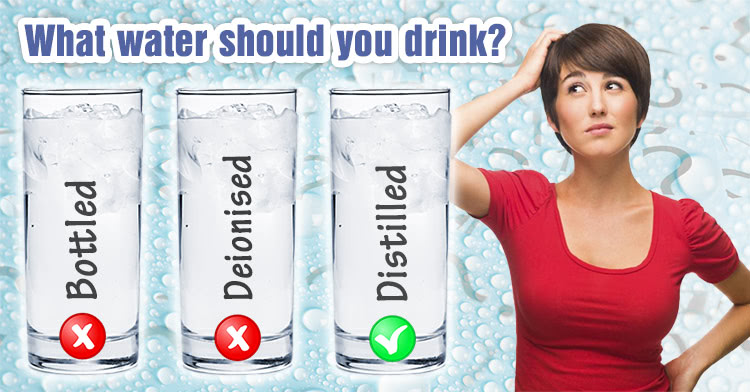
Distilled water has often been surrounded by a certain amount of controversy. Investigate further however and it’s usually found to simply be a case of confusion. Here we look at avoiding the confusion surrounding distilled water and show you just why you should be drinking it.
Distilled water and the mineral debate
One of the most common questions that surrounds distilled water is whether it lacks minerals. Yes our body does need minerals however they must be a special type of mineral that’s been processed by either the plant or food cycle. If this has occurred then our body can readily absorb these minerals via the chelation process when they’re combined with very specific amino acids. Minerals found in any kind of water are what’s known as inorganic minerals which are just pieces of rock, dirt or stone that have dissolved in the water.
Science proves that only plant life has the ability to absorb these inorganic minerals and convert them in to what’s known as usable minerals. It’s these usable minerals that can then be absorbed by our digestive system. Therefore it’s quite simple to understand that we must obtain our minerals and other such vital nutrients from fruits, animal life and vegetables. Medical and science experts alike, agree that this is pure and simple fact thus expelling any truth in the unfounded rumours that tap water provides adequate minerals and distilled water lacks vital minerals.
Our water distillers create fresh tasting H2O
Mineral content aside, there are many critics of distilled water that choose to attack its taste, claiming it to be flat and tasteless. They state it contains no oxygen and has no taste whatsoever.Distilled water may indeed taste different to the water you get from your taps in the kitchen however the water you receive from your taps contains chlorine and a number of other chemicals. The whole point of a water distiller is to remove these chemicals and any other foreign matters from the tap water. If a water distiller were ineffective at its job then the ‘taste’ would indeed remain. It should be noted that a taste or smell, or even an aftertaste that lingers in your mouth is simply the chemicals and toxins.
Distilled water leaves no aftertaste for the simple fact that it contains none of the chemicals and impurities, which lend itself to the ‘taste’ that so many people are used to. So essentially what you could say is that distilled water actually ‘tastes’ fresh and clean. For those who make ludicrous claims stating that distilled water contains no oxygen, we’d like to remind them that without oxygen, water simply couldn’t exist. Pure water otherwise known as H2O contains two molecules of hydrogen and just one of oxygen. Without oxygen, it would simply be hydrogen. Additionally it should be noted that dissolved oxygen is found in all types of water including distilled water.
Deionised water vs distilled water
There is one type of so called purified water that we do not recommend and that is deionised water but what is deionised water exactly? Deionised water is water that’s been processed by highly reactive chemical resins and it’s these reactive chemical resins that extract positive and negative charged ionic particles like sulfate and magnesium. Without real evaluation along with continued monitoring, this deionised water could actually leave it very highly reactive.
This type ofwater may be great at cleaning semiconductor chips (an electronic circuit such as a transistor or resistor) but it’s most certainly not recommended for drinking or for use in food. In fact, deionised water is now used heavily within industry however even then, workers are always strongly advised against drinking it. Employers even going to great lengths to provide bottled distilled water for their workers instead. Sadly, the majority of vending machines and supermarkets don’t necessarily give a second thought to using this type of water.
It should be noted that the process of deionisation does not remove toxic chemicals nor does it remove bacteria, in fact resins from the chemicals used in the deionisation process are notorious for providing the ideal breeding ground for bacteria. We highly advise you read labels on all the bottled water you consume in order to avoid drinking this particular type of purified water.
Make it yourself with our quality water distillers
Be aware that if a label states ‘for all distilled water uses’ that it’s not necessarily steam distilled water. More often than not, it’s actually deionised water or water that’s been treated with reverse osmosis bringing total solids down to below 10 milligrams in every litre. In the vast majority of cases, the purity of the water is far poorer than that of distilled water.So how can you be sure that you’re drinking distilled water? Well, there is one way and that’s by purchasing your very own at-home water distiller from Water Pure.
Water Pure are the leading suppliers of water distillers in Europe, offering high quality water distillers, perfect for any kitchen counter at unbeatable prices. Available in stainless steel and white stainless steel, these water distillers are not only quality in their manufacture, offering years and years of use but they’re also quality in their performance. Unlike many water distillers that take anywhere from five and even six hours to produce four litres of water (that’s if their boiling chambers can hold that much), the water distillers from Water Pure take less than four hours making them not only much more convenient but a lot cheaper to run too.
With no installation fees due to the water distiller only needing one plug socket, along with free delivery to anywhere within the UK, the prices at Water Pure really are unbeatable. Click here to buy water distillers today.


